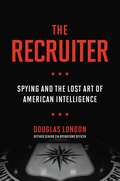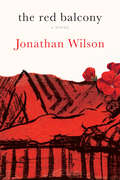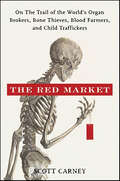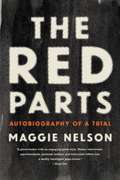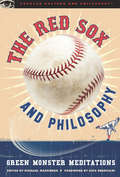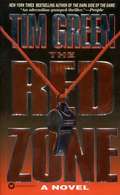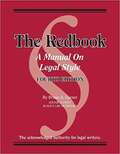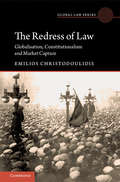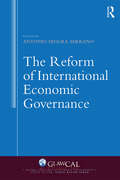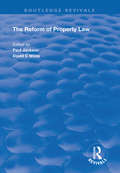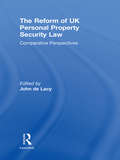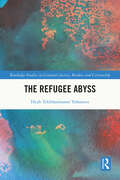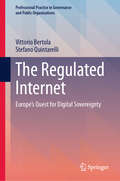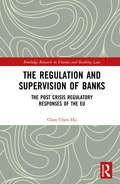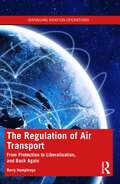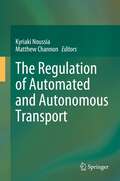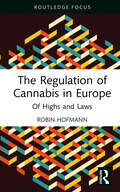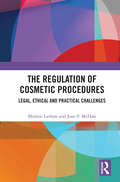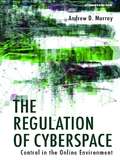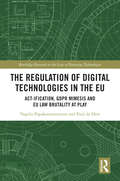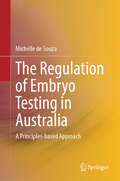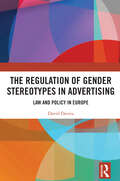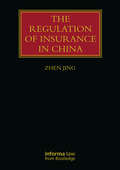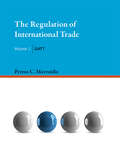- Table View
- List View
The Recruiter: Spying and the Lost Art of American Intelligence
by Douglas LondonThis revealing memoir from a 34-year veteran of the CIA who worked as a case officer and recruiter of foreign agents before and after 9/11 provides an invaluable perspective on the state of modern spy craft, how the CIA has developed, and how it must continue to evolve.If you've ever wondered what it's like to be a modern-day spy, Douglas London is here to explain. London&’s overseas work involved spotting and identifying targets, building relationships over weeks or months, and then pitching them to work for the CIA—all the while maintaining various identities, a day job, and a very real wife and kids at home.The Recruiter: Spying and the Lost Art of American Intelligence captures the best stories from London's life as a spy, his insights into the challenges and failures of intelligence work, and the complicated relationships he developed with agents and colleagues. In the end, London presents a highly readable insider&’s tale about the state of espionage, a warning about the decline of American intelligence since 9/11 and Iraq, and what can be done to recover.
The Red Balcony: A Novel
by Jonathan WilsonBased on actual events, a gripping novel of sex, love, history and justice in the tinderbox of British Mandatory Palestine, by the acclaimed author of A Palestine Affair"The story of what is arguably Israel&’s foundational murder trial—a tale of multiple identities and loyalties." —Joshua Cohen, Pulitzer-Prize-winning author of The Netanyahus It&’s 1933, and Ivor Castle, Oxford-educated and Jewish, arrives in Palestine to take up a position as assistant to the defense counsel in the trial of the two men accused of murdering Haim Arlosoroff, a leader of the Jewish community in Palestine whose efforts to get Jews out of Hitler&’s Germany and into Palestine may have been controversial enough to get him killed. While preparing for the trial, Ivor, an innocent to the politics of the case, falls into bed and deeply in love with Tsiona, a free-spirited artist who happened to sketch the accused men in a Jerusalem café on the night of the murder and may be a key witness. As Ivor learns the hard way about the violence simmering just beneath the surface of British colonial rule, Jonathan Wilson dazzles with his mastery of the sun-drenched landscape and the subtleties of the warring agendas among the Jews, Arabs, and British. And as he travels between the crime scene in Tel Aviv and the mazelike streets of Jerusalem, between the mounting mysteries surrounding this notorious case and clandestine lovemaking in Tsiona&’s studio, Ivor must discover where his heart lies: whether he cares more for the law or the truth, whether he is more an Englishman or a Jew, and where and with whom he truly belongs.
The Red Market: On the Trail of the World's Organ Brokers, Bone Thieves, Blood Farmers, and Child Traffickers
by Scott Carney“An unforgettable nonfiction thriller, expertly reported….A tremendously revealing and twisted ride, where life and death are now mere cold cash commodities.”—Michael Largo, author of Final ExitsAward-winning investigative journalist and contributing Wired editor Scott Carney leads readers on a breathtaking journey through the macabre underworld of the global body bazaar, where organs, bones, and even live people are bought and sold on The Red Market. As gripping as CSI and as eye-opening as Mary Roach’s Stiff, Carney’s The Red Market sheds a blazing new light on the disturbing, billion-dollar business of trading in human body parts, bodies, and child trafficking, raising issues and exposing corruptions almost too bizarre and shocking to imagine.
The Red Parts: Autobiography of a Trial
by Maggie NelsonLate in 2004, Maggie Nelson was looking forward to the publication of her book Jane: A Murder, a narrative in verse about the life and death of her aunt, who had been murdered thirty-five years before. The case remained unsolved, but Jane was assumed to have been the victim of an infamous serial killer in Michigan in 1969. Then, one November afternoon, Nelson received a call from her mother, who announced that the case had been reopened; a new suspect would be arrested and tried on the basis of a DNA match. <p><p> Over the months that followed, Nelson found herself attending the trial with her mother and reflecting anew on the aura of dread and fear that hung over her family and childhood--an aura that derived not only from the terrible facts of her aunt's murder, but also from her own complicated journey through sisterhood, daughterhood, and girlhood. <p> The Red Parts is a memoir, an account of a trial, and a provocative essay that interrogates the American obsession with violence and missing white women, and that scrupulously explores the nature of grief, justice, and empathy.
The Red Sox and Philosophy
by Michael MacomberThis volume in the Popular Culture and Philosophy series delves into the tragic and redemptive history of the Boston Red Sox baseball franchise. Drawing on philosophers from Aristotle to Sartre, chapters range from issues of faith and spirituality to tragedy, irony, existentialism, Sabermetrics, and the infamous "curse of the Bambino." With an emphasis on "Red Sox Nation" - the community of Red Sox fans across the globe - the book connects important philosophical ideas with one of the most storied teams in the history of Major League Baseball. The chapters make complex philosophical arguments easy to understand while providing an insider's knowledge of the hometown team. All but one of the authors in this volume are all Red Sox fans who comment on their team philosophically. There's even a Yankee fan's perspective! With a foreword by Dick Bresciani, vice president and official historian of the Boston Red Sox, this book provides a unique philosophical experience for the die-hard Red Sox fan.
The Red Zone
by Tim GreenThe owner of the NFL's Florida Marauders is dead, and the prime suspect is the Marauders' number-one player: big, restless, stylish Luther Zorn. The linebacker is guilty. But is he guilty of anything more than sleeping with his boss's wife? Enter Madison McCall. A high- priced, hard-driving defense attorney who's no stranger to the violent world of pro football players. She defends Zorn ... and plunges them both into a game far more dangerous than the one Zorn plays on Sunday afternoons. For here the opponents are invisible, and willing to murder anyone who gets in their way.
The Redbook: A Manual on Legal Style
by Bryan GarnerBryan A. Garner's Redbook: A Manual on Legal Style, 4th Edition (Coursebook)
The Redress of Law: Globalisation, Constitutionalism and Market Capture (Global Law Series)
by Emilios ChristodoulidisFrom a legal-philosophical point of view, The Redress of Law presents a critical analysis of a number of related doctrinal fields: constitutional, labour and EU Law. Focusing on the organisation and protection of work, this book asks what it means to protect work as an essential aspect of human (individual and collective) flourishing. This is an ambitious and highly sophisticated intervention in contemporary academic and political debates around a set of critically important questions connected to processes of globalisation and market integration. The author redefines the nature of legal and political thought in an age in which market rationality has exceeded its classic domain and has come to pervade the organization of social and political life. This restatement of critical legal theory is intended to defend the concept of constitutionalism and suggest new ways to deploy the law strategically.
The Reform of International Economic Governance (Global Law and Sustainable Development)
by Antonio Segura SerranoThe second half of the twentieth century saw the emergence of international economic law as a major force in the international legal system. This force has been severely tested by the economic crisis of 2008. Unable to prevent the crisis, the existing legal mechanisms have struggled to react against its direst consequences. This book brings together leading experts to analyse the main causes of the crisis and the role that international economic law has played in trying to prevent it, on the one hand, and worsening it, on the other. The work highlights the reaction and examines the tools that have been created by the international legal field to implement international cooperation in an effort to help put an end to the crisis and avoid similar events in the future. The volume brings together eminent legal academics and economists to examine key issues from the perspectives of trade law, financial law, and investment law with the collective aim of reform of international economic governance.
The Reform of Property Law (Routledge Revivals)
by Paul Jackson David C. WildeFirst published in 1997, this volume constitutes a collection of new papers by more than 20 United Kingdom and International experts on general and specific issues relating to the reform of all aspects of property law. Topics covered include the language of property law and the dangers of reform, the role of the Law Commission and the workings of Parliamentary procedures, registration of title to land, landlord and tenant, land pollution, mortgages, sale of goods, the Hague Convention on trusts, together with general comparative papers and papers dealing with specific issues of property law reform affecting Hong Kong, Ireland, Scotland and South Africa. The volume arises out of the successful conference 'The Reform of Property Law' hosted by the Centre for Property Law at The University of Reading in 1996.
The Reform of UK Personal Property Security Law: Comparative Perspectives
by John De LacyThere has been much discussion in the last ten years about the need to reform the law governing company charge registration, with many bodies including the Department of Trade and Industry and Law Commissions considering the case for reform of this area in the context of a wider scheme of personal property security reform. This has culminated in the coming into force of Part 25 of the Companies Act 2006, which is concerned with company charge registration. This major book features the work of international experts on personal property security law. It focuses on the reform of UK company charge law and argues that the Companies Act 2006 did not go far enough in reforming the law. It addresses the question as to whether the UK should follow the lead of other jurisdictions that have adopted US Article 9 type personal property security schemes. As well as considering current UK law the book also addresses the changes proposed by the Law Commissions and, despite current government inaction, considers whether these reform proposals should be adopted. The book contains major international comparisons and, in particular, looks at law reform in the USA, Canada, Australia, New Zealand, Singapore and Europe. This comparative treatment gives the reader a full perspective on this difficult and constantly developing area of law.
The Refugee Abyss (Routledge Studies in Criminal Justice, Borders and Citizenship)
by Hyab Teklehaimanot YohannesIn defiance of the refugee abyss, this book presents the flesh of pained bodies and the breath of displaced voices, contributing to the thread of traces yet to be forged and the politics yet to emerge, in a world where Relation takes precedence. The book unfolds in several traces. First, open wounds and scars represent the refugee abyss, revealing the onto-epistemic chains that silence displaced voices. These voices, through embodied subjects, recount their struggles in a world marked by violence. Second, the book questions the rights-based order, revealing how the human rights project is a new incarnation of the colonial civilising mission. It claims to elevate humanity, starting with those deemed uncivilised. Yet, its mask of benevolence, once upheld in the metropoles of empire, now appears hollow. Third, the book theorises the nationstate as a womb-abyss, a matrix that both births and consumes life. Fourth, it explores the refugee abyss as a realm of confinement and destitution, where lives are commodified, exploited, and destroyed. Fifth, it shifts from open wounds to the poetics of refuge, illustrating how life persists in the shadows of rights and laws, while death is inflicted through them. Finally, it reflects on untamed life, emerging from wounds and scars as a proclamation of the unfamiliar and enduring.This book will be of interest to students and scholars of criminology, criminal justice, and refugee studies. It will also appeal to political scientists and policymakers interested in issues of citizenship, human rights, and decoloniality.
The Regulated Internet: Europe's Quest for Digital Sovereignty (Professional Practice in Governance and Public Organizations)
by Vittorio Bertola Stefano QuintarelliThe Internet was once envisioned as a borderless realm, promising to unify nations into a peaceful global society and empower individuals with unlimited access to knowledge. Supported by Western deregulation, this dream flourished - until recently. The European Union's introduction of strict laws governing privacy, competition, and content moderation marked a turning point that shocked big tech and initiated a wave of regulations worldwide. In this book, two leading European experts present the reasons behind this seismic shift. They explain how American dominance by a few colossal companies has reshaped our online lives and triggered a movement towards a regulated Internet. This insightful book also offers perspectives on future developments, emphasizing that our collective decisions shape the digital landscape. This book is a must-read for anyone seeking to understand the changing landscape of Internet governance and its global implications.
The Regulation and Supervision of Banks: The Post Crisis Regulatory Responses of the EU (Routledge Research in Finance and Banking Law)
by Chen Chen HuOver the past two decades, the banking industry has expanded and consolidated at a stunningly unprecedented speed. In this time banks have also moved from focusing purely on commercial banking activities to being heavily involved in market-based and transaction-oriented wholesale and investment banking activities. By carrying out an all-encompassing set of activities, banks have become large, complex, interconnected, and inclined to levels of risk-taking not previously seen. With the onset of the 2008 global financial crisis it became apparent that there was an issue of institutions being too big to fail. This book analyses the too-big-to-fail problem of banks in the EU. It approaches the topic from an interdisciplinary perspective using behavioural finance as a tool to examine the occurrence of the global financial crisis and the emergence of the structural problem in large banking institutions. The book draws a comparison between the EU, the US and the UK and the relevant rules to assess the effectiveness of various approaches to regulation in a global context. Chen Chen Hu goes on to use behavioural analyses to provide new insights in evaluating the current structural reform rules in the EU Proposal on Bank Structural Regulation and the newly adopted bank recovery and resolution regime in the EU Bank Recovery and Resolution Directive and the Single Resolution Mechanism (SRM) in the Single Resolution Regulation.
The Regulation of Air Transport: From Protection to Liberalisation, and Back Again (Managing Aviation Operations)
by Barry HumphreysThe regulation of modern civil aviation can be traced back to the later years of the Second World War. An intense debate about the future regulatory regime resulted in a compromise which to this day essentially dictates the structure of the global airline industry. Further progress towards ‘normalising’ the industry appears to be slowing down, and perhaps even going into reverse. Without an understanding of the development of regulation, it is not possible to understand fully the industry’s current problems and how they might be resolved. Many books have been written about the development of international air transport, covering deregulation, privatisation, the emergence of new business models among other things, but few if any have taken a broad view of the trends which have determined the industry’s current structure. The Regulation of Air Transport charts the development of aviation from the end of the Second World War to the present day, following the key trends and disruptive forces. It provides an overview of what has determined the industry’s current structure, the problems still facing the industry and the ways in which it could develop in the future. This wide-ranging study is important reading for both professionals and academics within the aviation field, as well as anyone interested in the broader development of economic regulation.
The Regulation of Animal Health and Welfare: Science, Law and Policy (Law, Science and Society)
by Wyn Grant John McEldowney Graham MedleyThe Regulation of Animal Health and Welfare draws on the research of scientists, lawyers, economists and political scientists to address the current and future regulatory problems posed by the issues of animal health and disease. Recent events such as the outbreak of mad cow disease, epidemics of foot and mouth disease, concerns about bluetongue in sheep, and the entry into the food chain of the offspring of cloned cattle, have heightened awareness of the issues of regulation in animal disease and welfare. This book critically appraises the existing regulatory institutions and guiding principles of how best to maintain animal health in the context of social change and a developing global economy. Addressing considerations of sound science, the role of risk management, and the allocation of responsibilities, it also takes up the theoretical and practical challenges which here – and elsewhere – attend the co-operation of scientists, social scientists, lawyers and policy makers. Indeed, the collaboration of scientists and social scientists in determined and regulatory contexts such as that of animal disease is an issue of ever-increasing importance. This book will be of considerable value to those with interests in this issue, as well as those concerned with the law and policy relating to animal health and welfare.
The Regulation of Automated and Autonomous Transport
by Kyriaki Noussia Matthew ChannonThis book discusses various legal aspects of automated and autonomous transport. The regulation of automated and autonomous transport encompasses legislation on automated cars, ships, vessels, and drones. Questions surrounding this novel area of the law, which has attracted major worldwide interest and publicity, are likely to dominate our societies and everyday life in the years ahead. One major challenge addressed in this book is remedying the regulatory fragmentation that can be observed around the globe concerning legislation on automated and autonomous transportation systems. Written and edited by respected experts in the field, including academics and practitioners alike, this book seeks to fill an important gap in the literature.Given its focus and scope, the book will be of considerable interest to practitioners, academics, and policymakers, judges, students and secondary audiences, including engineers, sociologists, naval architects, all those involved in the automated industry, and people working in AI.
The Regulation of Cannabis in Europe: Of Highs and Laws
by Robin HofmannChanging attitudes towards cannabis across Europe are challenging old convictions of drug prohibition and making space for new approaches to the drug. This book delves into the evolving landscape of cannabis regulation across Europe and the world. Starting with Germany’s push for full legalization, the work highlights the hurdles faced by policymakers, offering a detailed analysis of the international and European frameworks that restrict drug policy reform and discussing potential loopholes to avoid them. The case of Germany and its struggle with cannabis reform serves as a valuable blueprint with guidance for other states considering implementing more progressive approaches to drugs. The volume explores the complexities of cannabis regulation in a concise and approachable way, targeting not only legal professionals but also policymakers and readers with an interest in the societal dynamics of drug policy reforms and how these are shaped by the European Union and international law. The book will be of interest to a broad audience that includes legal scholars and practitioners; students of criminology, international law, and European law; and those with an interest in EU security and health policies.
The Regulation of Cosmetic Procedures: Legal, Ethical and Practical Challenges
by Jean Mchale Melanie LathamThis book examines the ethical and regulatory debates surrounding the rise of the cosmetic procedures industry. In the past, cosmetic procedures were often seen as limited to a small number of wealthy older women. Today, such procedures have gone mainstream, partly facilitated by the rise of "non-invasive" techniques, such as the use of Botox and Dermal Fillers. While still a business dominated by the female consumer, there are also an increasing number of males undertaking cosmetic procedures as social expectations around appearance and ageing are challenged. At the same time, the rapid expansion of this business, and the incoherent, diverse approach to its regulation, have given rise to concern. It has been seen as a "Wild West". If cosmetic procedures go wrong, such procedures give rise to real risks of harm. This book examines the historical backdrop, current practice and risks associated with cosmetic procedures. It discusses the ethical and regulatory challenges for this area. It also examines the current legal frameworks concerning people, practitioners and products in the UK. The book also draws lessons from regulatory approaches in other jurisdictions with particular reference to the United States, Brazil and France. It then sets out a legal and regulatory framework that might better protect and empower the cosmetic consumer, now and in the future. The book is likely to be of particular interest to those working in the areas of health and medical law, socio-legal studies and political science.
The Regulation of Cyberspace: Control in the Online Environment
by Andrew MurrayExamining the development and design of regulatory structures in the online environment, The Regulation of Cyberspace considers current practices and suggests a regulatory model that acknowledges its complexity and how it can be used by regulators to provide a more comprehensive regulatory structure for cyberspace. Drawing on the work of cyber-regulatory theorists, such as Yochai Benkler, Andrew Shapiro and Lawrence Lessig, Murray explores and analyzes how all forms of control, including design and market controls, as well as traditional command and control regulation, are applied within the complex and flexible environment of cyberspace. It includes chapters on: the role of the cyberlawyer environmental design and control online communities cyber laws and cyber law-making. This book is an essential read for anyone interested in law and information technology.
The Regulation of Digital Technologies in the EU: Act-ification, GDPR Mimesis and EU Law Brutality at Play (Routledge Research in the Law of Emerging Technologies)
by Vagelis Papakonstantinou Paul De HertEU regulatory initiatives concerning technology-related topics have spiked over the past few years. On the basis of its Priorities Programme, which is focused on making Europe ‘Fit for the Digital Age’, the European Commission has been busily releasing new texts aimed at regulating a number of technology topics, including data uses, online platforms, cybersecurity, and artificial intelligence.This book identifies three phenomena which are common to all EU digital technologies-relevant regulatory initiatives: act-ification, GDPR mimesis, and regulatory brutality. These three phenomena serve as indicators or early signs of a new European technology law-making paradigm that now seems ready to emerge. They divulge new-found confidence on the part of the EU digital technologies legislator, who has now asserted for itself the right to form policy options and create new rules in the field for all of Europe.Bringing together an analysis of the regulatory initiatives for the management of technology topics in the EU for the first time, this book will be of interest to academics, policymakers, and practitioners, sparking academic and policymaking interest and discussion.
The Regulation of Embryo Testing in Australia: A Principles-based Approach
by Michelle de SouzaThis book examines the legal and ethical landscape of preimplantation genetic testing (PGT) in Australia, analyzing its current regulatory framework and exploring whether a more effective approach is needed. PGT allows prospective parents using assisted reproductive technology to select embryos based on genetic characteristics, raising complex ethical and legal questions. Should parents be permitted to test for and select against specific disabilities? Should there be limits on choosing certain traits? How should emerging technologies, such as screening for polygenic conditions and non-disease traits, be regulated? To address these challenges, the book proposes a national, principles-based framework for embryo testing regulation. This framework calls for federal legislation and the establishment of a national regulatory body, guided by three key principles. The protective principle ensures that embryo testing prioritizes the welfare and future autonomy of the child. The beneficence principle allows parents to make decisions in the best interest of their future children. The balance principle applies in cases where embryo testing is used to create a &‘saviour sibling&’ and requires weighing the welfare of the future child against the needs of an existing sick sibling. Through a doctrinal legal analysis, this book integrates perspectives from bioethics, disability studies, and philosophy to provide a comprehensive, interdisciplinary examination of embryo testing regulation. Accessible yet rigorous, it is an essential resource for legal scholars, policymakers, bioethicists, and anyone interested in the future of reproductive technology governance in Australia.
The Regulation of Gender Stereotypes in Advertising: Law and Policy in Europe
by David DaviesThis book provides an innovative and policy-oriented analysis of gender stereotypes in advertising regulation from a socio-legal perspective.Examining the law and policy of the European Union and three case studies in Sweden, Spain and the UK, the book draws on interviews, focus group data and desk research to critically assess the legislation and regulation on the use of gender stereotypes in advertising. Its focus is on the largely neglected question of the EU’s competence in the area of gender. And to assess this, the book considers various forms of ‘good practice’ through legislation, regulation and policy. It also explores the proscribing of gender stereotypes in advertising through ‘soft law’ measures such as self-regulation at state level, and action programmes and roadmaps at EU level. Finally, it critiques the lack of progress in achieving a unified code on the regulation of gender stereotypes whilst imagining what such a code might look like.The book will appeal to academics with research and teaching interests in EU law, gender equality and comparative law, as well as academics and practitioners involved with media and advertising regulation, anti-discrimination law and freedom of expression.
The Regulation of Insurance in China (Lloyd's Insurance Law Library)
by Zhen JingWith the rapid development of China’s insurance industry and the opening of the Chinese insurance market to the world, Chinese insurance law and regulation has become an increasingly relevant topic for insurance practitioners and academics. The Regulation of Insurance in China therefore provides a much needed analysis of the Chinese regulatory system. This is the first systematic text written in English on the regulation of insurance in China and provides a comprehensive and systematic analysis of rules of law and administrative regulations on China’s insurance industry and insurance market, covering four level of regulatory hierarchy − the statutory law, the regulations enacted by the central government (the State Council), the regulations developed by the insurance supervision and regulation authority of the State Council, and self-regulations by the insurance industry. This book is essential reading for insurance companies and legal practitioners looking to do business in China, as well as reference for lawyers practising insurance law. It is also a useful resource for students and academics studying Chinese law.
The Regulation of International Trade, Volume 1: GATT
by Petros C. MavroidisA detailed examination of the GATT regime for international trade, discussing the negotiating record, policy background, economic rationale, and case law. The General Agreement on Tariffs and Trade (GATT) was created alongside other towering achievements of the post-World War II era, including the United Nations, the World Bank, and the International Monetary Fund. GATT, the first successful agreement to generate multilateral trade liberalization, became the principal institution to administer international trade for the next six decades. In this book, Petros Mavoidis offers detailed examination of the GATT regime for international trade, discussing the negotiating record, policy background, economic rationale, and case law. Mavroidis offers a substantive first chapter that provides a detailed historical background to GATT that stretches from the 1927 World Economic Conference through Bretton Woods and the Atlantic Charter. Each of the following chapters examines the disciplines agreed to, their negotiating record, their economic rationale, and subsequent practice. Mavroidis focuses on cases that have influenced the prevailing understanding of the norm, as well as on literature that has contributed to its interpretation, and the final outcome. In particular, he examines quantitative restrictions and tariffs; the most favored nation clause (MFN), the cornerstone of the GATT edifice; preferential trade agreements and special treatment for products originating in developing countries; domestic instruments; and exceptions to the obligations assumed under GATT. This book's companion volume examines World Trade Organization (WTO) agreements regulating trade in goods.
